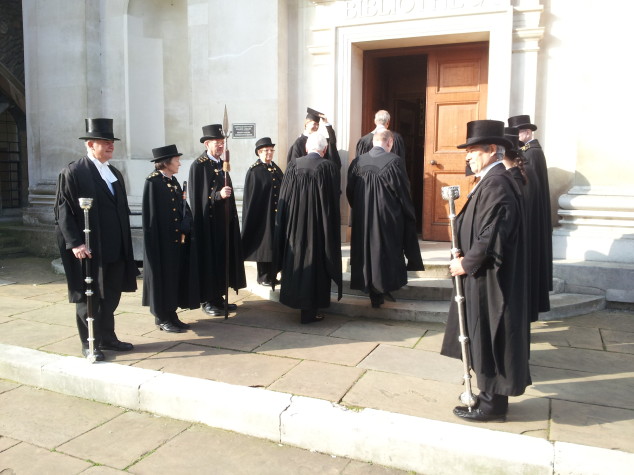Perhaps only in Cambridge and Oxford would you observe the Vice-Chancellor of the University, dressed in full academical regalia in the fine surroundings of the Senate House, discussing advances in biomedical research, graphene and materials science.
Today being the first weekday of Michaelmas term, there was a meeting of Congregation in the Senate House. This means an official meeting of the Regent House, the governing body of the University, which consists of University Officers, and Heads and Fellows of Colleges. Confusingly Regent House is not a building, whereas Senate House is. The Senate used to be the governing body till 1926 and still exists for the limited purpose of choosing the Chancellor and High Steward of the University.
This particular Congregation is to elect the new Proctors and Deputy Proctors, who oversee degree ceremonies and discipline and “defend freedom of speech within the University”. The elections are conducted through a short ceremony conducted mostly in Latin and involving the exchange of some very ancient looking books.
The reason why I and others attended the Congregation was to hear the annual speech by the Vice-Chancellor of the University, Professor Sir Leszek Borysiewicz (“Borys”). The full speech is available here. Borys’s theme was the University’s longstanding (and hard won) freedom of choice and the responsibilities this brings. Perhaps of most interest to a general audience were the three areas of future expansion.
First, the colleges recently agreed to expand graduate numbers by two per cent a year. That doesn’t sound much but cumulatively will create a major challenge for the colleges and University departments to accommodate and properly support the growing student body.
Second is the already burgeoning biomedical campus, which will soon be joined by the new global HQ of AstraZeneca, to become one of the largest concentrations of medical research in the world. (More on the biomedical campus in this blog).
And third is the new North West Cambridge pr0ject, which has already started and will allow a large expansion of University research, plus new housing and urban development. (More on North West Cambridge in this blog).
The charm of this strange but remarkably effective institution lies for me in the contrast between the hundreds of millions of pounds being channelled into scientific research, housed in these new sites, and the fact that after the ceremony we were escorted by the University’s “bulldogs”, the internal police through whom the Proctors used to exercise discipline. Here they are in their ceremonial uniform.
Before the 1960s they still actively patrolled the streets of Cambridge for misbehaving undergraduates (here is a picture of Proctor and bulldogs from the early twentieth century, and very fierce they look too).
The ceremony was followed by traditional refreshments in the University Combination Room. This means Madeira and seed cake. I first acquired a knowledge and then love of Madeira as a Fellow of St. Catharine’s College. It’s a delicious fortified wine somewhere between sherry and port and combining the best of them, produced in the Portuguese island of the same name. You don’t come across it very often. Why it’s traditionally given at the University, I’m not sure.
I’m reliably informed by the excellent Director of External Affairs for Judge, Nathalie Walker, that on some occasions the University gives out sixpences, an obsolete small coin that once had some considerable value but is now equivalent to 2.5p. The sixpence was first struck in the reign of Edward VI, in 1551, a period during which, Borys told us, the then Vice Chancellor Andrew Perne carefully navigated the University through the changing and hazardous streams of English religious turmoil. Whatever challenges the University faces today, at least the VC doesn’t need to worry about being hanged for supporting the wrong church.
Independence, hard won
New major developments: west Cambridge and biomedical campus
Expansion of graduate students



Leave a Reply